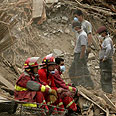Some 16,000 victims are estimated likely to perish in an earthquake of considerable magnitude, but budgetary setbacks are impeding the ability of Israel's police to prepare for the colossal task of identifying the bodies ahead of their burial – Chief Superintendent Yossi Vilner warned the Knesset Special
Committee for the Examination of Earthquake Preparedness on Monday.
The national preparedness plan consigns responsibility over the identification process to the police, which according to Vilner is currently only capable of identifying 250 bodies per day. Computer software designed to speed up the process has already been ordered from abroad, but the $220,000 system will only be in use towards early 2009.
The estimated number of fatalities is based on projections evaluating the extent of destruction to housing and public structures in the event of a large-scale quake.
Geologists assert that deadly earthquakes strike Israel in an 80-year seismic cycle; the most recent was recorded in 1927.
Vilner noted that plans would also have to be made for the possibility of bodies first being buried and then exhumed for identification. Committee chairman, MK Moshe Kahlon (Likud) said the alternative of storing the bodies in cooling containers was also being considered.
Shortage of pathologists
According to Vilner, the police forensic department lacks a necessary $1.230 million to properly equip its emergency stock reserves.
The funding would be used, among other things, for the establishment of a national biometric database composed of DNA and fingerprint identification markers.
Vilner also stressed the shortage of pathologists and suitably upgraded laboratories. At present time the police rely on seven physicians at the Forensic Institute in Abu Kabir, who can only identify 100 bodies a day.
Police administrators are currently drafting a protocol to coordinate efforts on a national level, though each district already has a regional plan allowing it to operate independently in the event of power cuts and the
destruction of transportation infrastructure.
The necessary funding being sought for the plan stands at $9.8 million, police said. But the deputy director of the Internal Security Ministry, Eliezer Rosenbaum said he doubted the police would be able to receive the full amount without a change to the current budget.
















